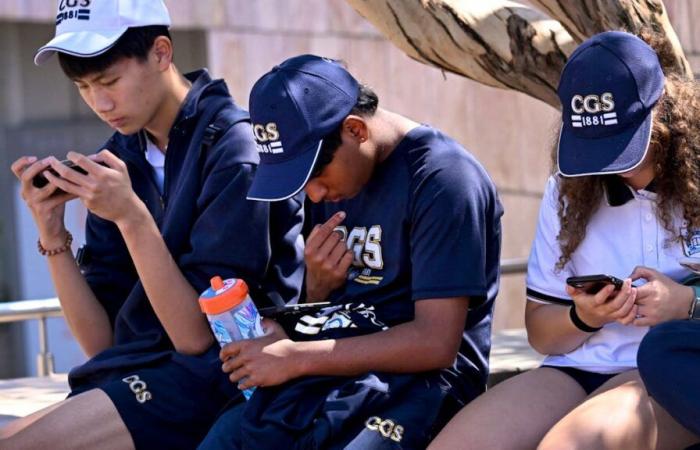Young people on their smartphones in Melbourne on November 28, the day Parliament banned access to social networks for under 16s.
AFP
The Australian Parliament adopted pioneering legislation on Thursday, November 28, prohibiting access to social networks for those under 16, among the most restrictive in the world for platforms such as X, Tik Tok, Instagram or Facebook.
The text, which obtained the green light from both houses of Parliament and bipartisan support, should soon require these platforms to take “reasonable measures” to prevent these adolescents from having an account. Failure to comply with this obligation will result in fines of up to 50 million Australian dollars (28.7 million francs).
The bill received the green light from the Australian Senate on Thursday, after that of the Lower House the day before, and its entry into force is beyond doubt.
Center-left Prime Minister Anthony Albanese, who is preparing for elections early next year, enthusiastically defended the new rules and rallied the support of many fathers and mothers. Ahead of the vote, he said social media was “a platform for social pressure, a source of anxiety, a channel for scammers and, worst of all, a tool for online predators.”
He said he wanted young Australians to “put down their phones and instead go to the football and cricket fields, tennis, volleyball and swimming pools”.
Before the vote, several platforms denounced a “rushed” decision, expressing “serious concerns” about potential “unintended consequences”.
Young people will try to circumvent the law
Young Australians are already saying they intend to circumvent this ban. “I will find a way, and my friends will do the same,” Angus Lydom, 12, told AFP. “I would like to continue using social networks, it would be weird not to have them and not to be able to talk to my friends when I am at home,” he explains.
The same goes for Elsie Arkinstall, 11, who believes that social networks have their place, even for children, to watch baking or art tutorials. “You can’t learn all this from books,” she says.
Doubts about technical feasibility
On paper, the ban is one of the strictest in the world. But the exact contours of its application remain unclear. The text provides almost no details on its application methods, so much so that some experts have expressed doubts about the technical feasibility of this ban and questioned its symbolic nature.
Tech companies will have at least a year to comply with the new obligation, time for Australian regulators to clarify the details relating to the application of the law.
WhatsApp and YouTube exempted
Certain platforms such as WhatsApp and YouTube, which adolescents may need to do their homework, should also be exempted.
Programs teaching children to think “critically” about what they see online should be adopted, like Finland, social media expert Susan Grantham told AFP.
The entry into force of this new legislation will be closely monitored abroad, with several countries also considering implementing similar restrictions. In Switzerland, a poll shows that a majority is in favor of such measures.
In Florida, a law is due to come into force in January to prohibit the opening of an account to those under 14, but the practical arrangements have not been determined.
In Spain, the government also presented a draft bill in June to prohibit access to social networks for those under 16, although the method of age verification has not been determined. There is no scheduled date for review of the text.
China has restricted access for minors since 2021 and requires identification via an identity document. Those under 14 cannot spend more than 40 minutes a day on Douyin, the Chinese version of TikTok, and online gaming time for children and adolescents is limited.
(MP/AFP)






